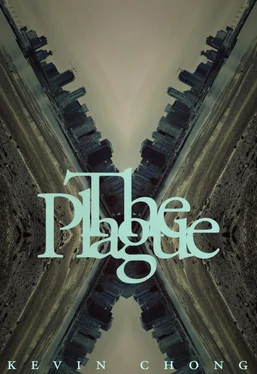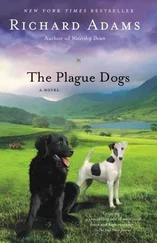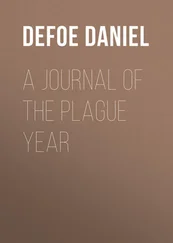As usual, people contacted Siddhu for publicity. Cleaning services touted their effective, environmentally friendly decontamination policies. Therapists wanted to be profiled on their trauma-counselling services. Even Rieux cornered him to write a story.
“In case you didn’t read my email, I am starting a sanitation league,” the doctor announced at their coffee shop. “Infection rates are too high in this area.”
“About that,” Siddhu answered, digging into his pocket to pay for his Americano, “I meant to reply. It didn’t fly in the story meeting.” That last part was a lie. “One question: Isn’t that the city’s job, sanitation?”
“Everyone in City Hall is preoccupied. Government acts too slowly. It’s up to private citizens to respond,” Rieux said. Siddhu saw an impatience in his rhetoric that reminded him of the nineteen-year-olds he’d known in university who wore neckties to class and read Ayn Rand. “More people will die than necessary.”
Rieux told him that he’d lead his sanitation squad on weekends and evenings and already had two volunteers. Siddhu was tired enough as it was. He thought of people like Rieux—inexhaustible and determined—and believed it must be fear that drove them. Not fear of disease or dying; Rieux was chasing something else away.
Siddhu left it at that and returned to work. His young employer texted him from the rooftop to come up and discuss a story. Siddhu grabbed his coat and scarf and took the two steep flights of stairs with dread. Even the cold and snow hadn’t persuaded Horne-Bough to find another place to conduct his private meetings. Instead, he installed a heat lamp under which he huddled in a fur-lined parka and fingerless gloves while vaping. Siddhu stood under the lamp as if it was an umbrella.
“I wanted to discuss your performance,” Horne-Bough said.
Siddhu, his boss explained, had been providing comprehensive coverage of the spread of the disease. He had proven himself worthwhile on that end. His contact list and pedigree were also assets. But he hadn’t broken any news. He had yet to generate the kind of excitement that drove web traffic and earned subscriptions.
“I’ve been doing what I thought was best,” Siddhu said. “We haven’t had any real story meetings.”
“We don’t do those.” Horne-Bough half-shrugged. “You’re new here, but I don’t want you to get surpassed,” he said. “So that’s why I’ve come up with a story idea. I want you to conduct the first interview with Romeo Parsons since his scandal.”
Horne-Bough had already been contacted by the PR company that the wealthy mayor had hired privately. “I insisted that you, as our senior writer, be the one to speak to them,” he said. “There was push-back, but we kicked the shit out of it.” He presented Siddhu with a contact number on a scrap of paper. “Can you set something up?”
Siddhu nodded and took the number. He already had a story to cover that night.
Early in the evening, Siddhu took a car2go to the edge of the Grand-view Highway until he reached a set of electronic roadwork signs placed a few blocks before the spotlights, fences, and guard towers. They were typical roadwork signs that warned drivers of a stoppage ahead and asked them to take an alternate route. They were like trigger warnings that cautioned locals who wanted to pretend that nothing had changed to avoid going farther.
He came to the foot of the guard tower. Between the towers, guards with rifles on all-terrain vehicles patrolled the length of the fence. On the other side, coming into the sealed city, was an unloading area where the freight of a fleet of eighteen-wheelers was being inspected by men with machine guns. A Canadian Armed Forces captain, who wore a pair of binoculars around his neck, stepped out of a door. Siddhu held up the lanyard with his ID, but the army captain didn’t bother to look.
“You’re the reporter,” he said. “You missed all the fun.”
Siddhu was invited into the guard tower where he was given a bullet-proof vest. The army captain was a reservist who lived outside the city in Chilliwack. He wore light fatigues and stood about as tall as Siddhu—a few inches past six feet—but, when they shook hands, the officer’s hand enveloped the reporter’s. He told Siddhu he’d been stationed here since the outbreak began.
The eighteen-wheelers brought basic food items, medical supplies, and fuel into the city. The officer’s job was to make sure that nothing was being smuggled in or out. Alcohol, hard drugs, and luxury items had been confiscated while he was on duty. “Even in a quarantine zone, some people can’t live without their $25,000 watches,” he said. “We do a good job catching their middlemen.”
“But why has the black market been thriving?” Siddhu asked. “You can still buy all these goods through connections—or online—if you have enough money.”
“We have our theories. Smuggling doesn’t occur through trucks or trains—we handle that. The airports have been closed. It exists only by boat,” he said before he seemed to notice the voice recorder in front of him. “That was off the record.”
Siddhu decided not to correct him about what “off the record” meant. He let the officer disparage the work of the coast guard until a truck approached the gate. It had been emptied of its cargo. The driver rolled down the window and presented him with a security card, which the army captain swiped through a tablet encased in a bulky military-looking shell and had a reader attached to it. The inspection process took nearly a quarter of an hour, as the line behind the truck grew. Drivers, by law, were not allowed to step out of their vehicles. Most of them carried piss bottles because they couldn’t use the washroom. Soldiers with dogs boarded the cargo holds while others in gas masks fumigated the trucks’ exteriors.
Over a period of three hours, dozens of trucks came in and out. Siddhu chatted with the army captain, who was amiable, and enjoyed his company. When he felt comfortable enough, Siddhu asked him about rumours made about compassionate “exceptions.” The soldier’s expression remained fixed as though he hadn’t heard.
“There are stories in the ether about people who have been let out of the city because there’s a relative in another city who’s dying,” Siddhu added. “I’ve heard people talking about diplomats who succeeded in getting citizens of their countries airlifted back to their home nations, where they are isolated for a period of time and released. Do you know anything about this?”
The captain’s tone became much more officious, even stilted. “The only people who have been in and of the city, as far as I know, have been truck drivers or infectious disease experts,” he said. “I get asked that question a lot.”
“My family is in the suburbs,” Siddhu explained. “I’ve been living in a hotel. My boys are a year old.”
“If you’re going to escape,” he told him without making eye contact, “the best way would be to go by boat. Find someone who knows what they’re doing, someone who has a licensed driver. Now, that’s off the record, too.”
From their elevated perch, they both looked out onto the highway at the commuter traffic that bypassed the city. Siddhu used to hate traffic. But now he saw the beauty—the order and purpose—in the car lights on the highway. He saw minivans in the High Occupancy Vehicle lane and imagined families returning from a visit to grandparents. In other cars, he pictured lonesome fathers getting home as their kids were being sent to bed.
The trucks came steadily as they watched from the tower. Near the end of Siddhu’s evening, a drone appeared in the sky. It was so small at first that the army captain needed to point it out. “We get one every night,” he told Siddhu, passing the binoculars. This drone was white with four propellers and a camera on its base. “It’s either a single asshole or a bunch of them who think they were the first ones to come up with this idea.”
Читать дальше












